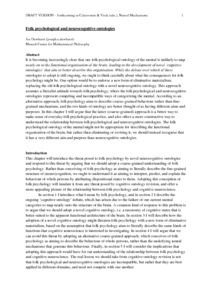Dewhurst, Joe
(2020)
Folk psychological and neurocognitive ontologies.
[Preprint]
![[img]](https://philsci-archive.pitt.edu/17269/1.hassmallThumbnailVersion/Dewhurst%20forthcoming%20-%20Folk%20psychological%20and%20neurocognitive%20ontologies.pdf)  Preview |
|
Text
Dewhurst forthcoming - Folk psychological and neurocognitive ontologies.pdf
Download (286kB)
| Preview
|
Abstract
It is becoming increasingly clear that our folk psychological ontology of the mental is unlikely to map neatly on to the functional organisation of the brain, leading to the development of novel ‘cognitive ontologies’ that aim to better describe this organisation. While the debate over which of these ontologies to adopt is still ongoing, we ought to think carefully about what the consequences for folk psychology might be. One option would be to endorse a new form of eliminative materialism, replacing the old folk psychological ontology with a novel neurocognitive ontology. This approach assumes a literalist attitude towards folk psychology, where the folk psychological and neurocognitive ontologies represent competing and incompatible ways of categorising the mental. According to an alternative approach, folk psychology aims to describe coarse-grained behaviour rather than fine-grained mechanisms, and the two kinds of ontology are better thought of as having different aims and purposes. In this chapter I will argue that the latter (coarse-grained) approach is a better way to make sense of everyday folk psychological practice, and also offers a more constructive way to understand the relationship between folk psychological and neurocognitive ontologies. The folk psychological ontology of the mental might not be appropriate for describing the functional organisation of the brain, but rather than eliminating or revising it, we should instead recognise that it has a very different aim and purpose than neurocognitive ontologies.
Monthly Views for the past 3 years
Monthly Downloads for the past 3 years
Plum Analytics
Actions (login required)
 |
View Item |



